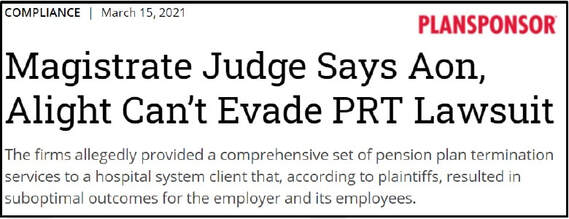|
The lawsuit involves a Florida based hospital provider that hired Aon to terminate its $100+ million DB plan which included lump sum election services. Things went awry when the take-up rate for the lump sum choice came up less than Aon had advertised… Magistrate Judge Says Aon, Alight Can’t Evade PRT Lawsuit | PLANSPONSOR
First, it's important to note that a decision went in Aon’s favor since this suit was filed and the article written. Aon, Alight Win Judgment in Hospital PRT Lawsuit | PLANSPONSOR In the actual complaint in the case the court just addressed preliminary motions. However, it is clearly critical of Aon/Hewitt, and is sympathetic with the plaintiff. and justifies its arguments with precedent, logic, and evidence. The breach in promise regarding participant services is not the central element in the case. It is part of a larger and more directly illegal problem: did Aon/Hewitt breach its fiduciary duty with regard to investment strategy and timing? The evidence indicates that they did, and this was mostly in ways unrelated to the failure to provide participant services. And to the extent the participant services are part of the problem, the complaint is not DIRECTLY that they failed to provide them (and therefore injured the interests of the participants) but that they did not persuade enough participants to take the lump sum option, which hurt the financials of the transaction and resulted in additional losses to the plan sponsor. “Leading up to the lump sum election window, Hewitt did not perform all the communications services that it contracted to perform under Schedule 5 of the [contract], including announcements, in-person meetings, webinars, brochures, posters, banners and other print materials,” the report states, citing the plaintiffs’ allegations. “Ultimately, only 67% of eligible plan participants elected to take a lump sum, instead of the projected 80%. … To complete plan termination, the plan’s invested assets were liquidated in two parts, first to pay lump sum benefits, and then to buy annuities. Plaintiffs claim that despite FRC’s requests, Aon Hewitt Investment Consulting refused to liquidate the plan funds for weeks leading up to December 2016.” It also looks like they do not take participant services very seriously. They promise, then back out of delivering. At least in this one situation -- but I see nothing in this situation that needed to interfere with their delivery of those services, and I didn't notice any sign of internal push-back within Aon about not fulfilling their promises. How will Aon/Hewitt and other firms handle participant services going forward? They could conclude that they need to do a much better job of it and then follow through on that. Or they could go the other way and see the offer of participant services as a potential liability for them, and so they could scale back offering these services. It's also important to note the motivation for providing these services -- i.e., to maximize the percentage who take the lump sum offer. They do this because it's cheaper and less financially risky for the plan sponsor to pay out lump sums than it is to buy annuities. But this means that they interpret their own fiduciary responsibility as aimed particularly at the plan sponsor, and do not feel the same fiduciary responsibility to the plan participant. But the fiduciary role arises from ERISA, and the purpose of ERISA is to protect the interests of participants, and famously puts a lot of extra burdens on the plan sponsor that cost them money, so the law is on the participants' side much more than on the plan sponsors' side. And therefore taking the side of the sponsors (by actively promoting lump sums instead of offering neutral or participant-centric advice) itself is arguably a breach pf fiduciary duty -- though the court didn't address this and almost certainly won't. Furthermore, as the court in this case does say, AON/Hewitt probably had a fiduciary duty even if they had not explicitly said in advance they were acting as a fiduciary. One could argue, therefore, that the Aon/Hewitt approach, which appears motivated by their own self-interest in making the plan sponsor happy, is actually (or at the very least potentially) illegal. The key takeaway seems to be: Do you want to work with a firm whose mission is to help participants make the best decisions for THEM -- keeping in mind that you [the decision-makers] along with your colleagues and people who have worked for you for many years are the beneficiaries here -- or will you trust the quantity and quality of help you will get from one of the giant firms whose main interests and motivations lie elsewhere?"
1 Comment
|
Home Plan De-Risking Participant Services Sample Co. Lump Sum Elections Guarantees CES-CREWS Blog About Contact
© 2016–2024 Corporate Executive Strategies. All rights reserved.
© 2016–2024 Corporate Executive Strategies. All rights reserved.


 RSS Feed
RSS Feed